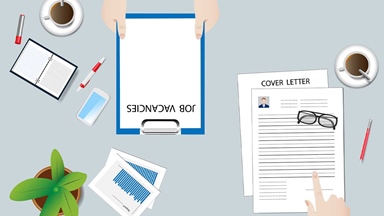Loading component...
At a glance
Type “write a cover letter for a financial analyst role” into Open AI’s ChatGPT, and, within three seconds, you receive six editable paragraphs detailing work experience and reasons you are drawn to the job opportunity.
Generative AI tools such as ChatGPT have revolutionised the process of generating written documents – and not just for people for whom writing does not come naturally. When it comes to the bane of job applications – the dreaded cover letter – is it time to drop them altogether?
Some recruiters turn away from cover letters
For Kent Maxwell, senior manager at specialist accounting recruiter Richard Lloyd, the answer is a resounding “yes”.
“We don’t read cover letters anymore, and companies don’t ask for cover letters anymore,” he says. “Of all our hundreds of clients, we only have one client that asks for a cover letter.”
Maxwell says one of the reasons for the cover letter’s demise is the way people apply for jobs, which has changed dramatically in the past 10 to 15 years.
“Back then, you would take a lot more care to think about the job you’re applying for and how your skill set relates to the application. The issue now is that everybody has smartphones,” he says.
“You can apply so quickly and so easily, and because of that hit rate, people just don’t think carefully about what jobs they’re actually going for.
“We have to trawl through a lot more applications now, and because of that, we wouldn’t even have time to read cover letters.”
Other recruiters still ask for cover letters
Denny Nesbitt, career development specialist with the University of Wollongong, disagrees. She believes that, while candidates do not necessarily enjoy writing cover letters, skipping them entirely is a wasted opportunity.
“The recruiter in the job advert will, more often than not, tell you if they want a cover letter,” she says. “You have to go by what they want.”
If the ad asks for a cover letter, candidates should use it as an opportunity to directly address what the employer is looking for in the role.
“You can make sure all those key points come across in a way that can sometimes get a bit lost in a resume. In a cover letter, you can tell them exactly why you’re the right person for the job.”
In her own coaching business, Nesbitt advises job seekers to be guided by the language used in the job description and echo them back to the hiring manager.
“They may be using an applicant tracking system, and that is going to be scanning for those keywords – not just in the resume, but in the cover letter as well,” she says.
“If those keywords are mentioned, you’ve got a better chance of getting through that system. That said, you don’t want to overfill your resume and cover letter with key words. It still needs to make sense.”
Complimentary course for CPA Australia members
Use the cover letter to explain yourself
Michael Edelstein CPA, accounting recruiter and founder of Recruitment Expert, says a cover letter is a great way to explain career “anomalies”, such as career breaks, or draw attention to any side hustles or part-time business endeavours.
“If you are an ideal fit and meet all the criteria, then your CV will speak for itself. However, if you are making a career change or missing key skills, then a really good cover letter might bridge that gap to give you a look in,” he says.
As for using generative AI tools, “if you are the type that struggles to express themselves on paper, then ChatGPT is a saviour,” says Edelstein.
“If you are applying for numerous roles and want a tailor-made cover letter for each one, then ChatGPT will save you loads of time.”
To produce good results with generative AI, Edelstein recommends providing enough details about yourself and the job description, and using effective prompts for tone and length, so the result doesn’t come out sounding too generic.
“Then review it and make appropriate modifications. Keep in mind – unless you have trained ChatGPT to write in your persona, a trained eye can pick up on content that was AI-generated.”
7 tips for structuring the perfect cover letter
If you follow a few simple rules, a cover letter should be easy to write and not something to lose sleep over, says career coach Denny Nesbitt.
- Find out the name of the recruiting manager and address your cover letter to them.
- Introduce yourself and state why you are applying, to provide context.
- Include a short statement about yourself, such as “I have worked in the finance industry for 5 years, and I wish to highlight the following experience”.
- Bullet points that tell the employer why you are the right person for the role are perfectly acceptable.
- Finish by telling the recruiter why you want the role. “In a cover letter, you can express your enthusiasm for the role and the company in a way that you just can’t really do inside a resume.”
- In the last paragraph talk about why you want to work at this company, and what features make it attractive to you.
- When it comes to word length, be guided by the job ad. If no guidelines are provided, keep it to a page. “If they are asking you to address key selection criteria, then don’t go over two pages.”

